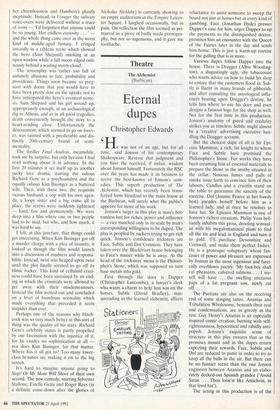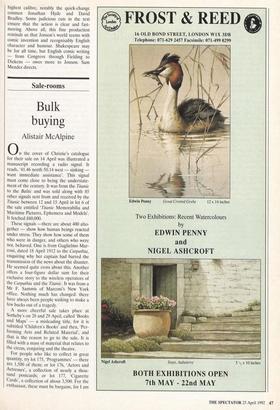The Alchemist (Barbican)
Eternal dupes
Christopher Edwards
c was not of an age, but for all time,' said Jonson of his contemporary Shakespeare. Reverse that judgment and you have the received, if unfair, wisdom about Jonson himself. Fortunately the RSC over the years has made it its business to revive the best-known of Jonson's com- edies. This superb production of The Alchemist, which has recently been trans- ferred from Stratford to the main house at the Barbican, will surely whet the public's appetite for more of his work.
Jonson's target in this play is man's bot- tomless lust for riches, power and influence — a vice matched only in its scale by man's corresponding willingness to be duped. The play is peopled by suckers trying to get rich quick. Jonson's confidence tricksters are Face, Subtle and Dol Common. They have taken over the Blackfriars house belonging to Face's master while he is away. At the head of the tricksters' menu is the Philoso- pher's Stone, which was supposed to turn base metals into gold.
First through the door is Dapper (Christopher Luscombe), a lawyer's clerk who wants a charm to help him win on the horses. Subtle (David Bradley), mas- querading as the learned alchemist, affects reluctance to assist someone to sweep the board not just at horses but at every kind of
gambling. Face (Jonathan Hyde) presses Dapper's case for him, urges. Dapper to up
the payments to the distinguished doctor, promises him an encounter with the Queen of the Fairies later in the day and sends him home. This is just a warm-up routine for the gulling that is in store.
Various dupes follow Dapper into the house. There is Drugger (Albie Wooding- ton), a disgustingly ugly, shy tobacconist who wants advice on how to build his shop to ensure that the customers flood in. Sub- tle is fluent in many brands of gibberish, and after consulting the astrological influ- ences bearing upon Drugger's destiny, he tells him where to site his door and even designs a fatuous logo for the shop as well. Not for the first time in this production, Jonson's anatomy of greed and credulity strikes you as timeless: Subtle might almost be a `creative' advertising executive han- dling the Drugger account.
But the choicest dupe of all is Sir Epi- cure Mammon, a rich, fat knight to whom Face and Subtle have promised the Philosopher's Stone. For weeks they have been creaming him of essential materials to prepare the Stone in the smithy situated in the cellar. Noxious fumes and palls of smoke issue forth to convince him of their labours. Candles and a crucifix stand on the table to guarantee the sanctity of the exercise. Dol (Joanne Pearce at her bawdy best) parades herself before him as a learned lady, and at once he resolves to have her. Sir Epicure Mammon is one of Jonson's richest creations. Philip Voss bril- liantly inhabits this gross, drooling sensual- ist with his megalomaniacal plans to find all the tin and lead in England and turn it to gold: purchase Devonshire and Cornwall, and make them perfect Indies.' He is a grotesque voluptuary whose fan- tasies of power and pleasure are expressed by Jonson in the most ingenious and farci- cally overblown poetry: 'My foot-boy shall eat pheasants, calvered salmons ... I my- self will have ... the swelling unctuous paps of a fat pregnant sow, newly cut off. . . .
The Puritans are also on the receiving end of some stinging satire. Ananias and Tribulation Wholesome, beneath their zeal and condemnations, are as greedy as the rest. Guy Henry's Ananias is an especially inspired comic creation, burning with self- righteousness, hypocritical and rabidly anti- popish. Jonson's exquisite sense of structure in this play ensures that as the promises mount and as the dupes return expecting their rewards, Face, Subtle and Dol are reduced to panic in order to try to keep all the balls in the air. But there can be no funnier scene than the one Jonson engineers between Ananias and an elabo- rately decked-out Spanish grandee (`Avoid Satan ... Thou look'st like Antichrist, in that lewd hat').
The acting in this production is of the
highest calibre, notably the quick-change conmen Jonathan Hyde and David Bradley. Some judicious cuts in the text ensure that the action is clear and fast- moving. Above all, this fine production reminds us that Jonson's world teems with comic invention and recognisably English character and humour. Shakespeare may be for all time, but English comic writing — from Congreve through Fielding to Dickens — owes more to Jonson. Sam Mendes directs.



























































 Previous page
Previous page